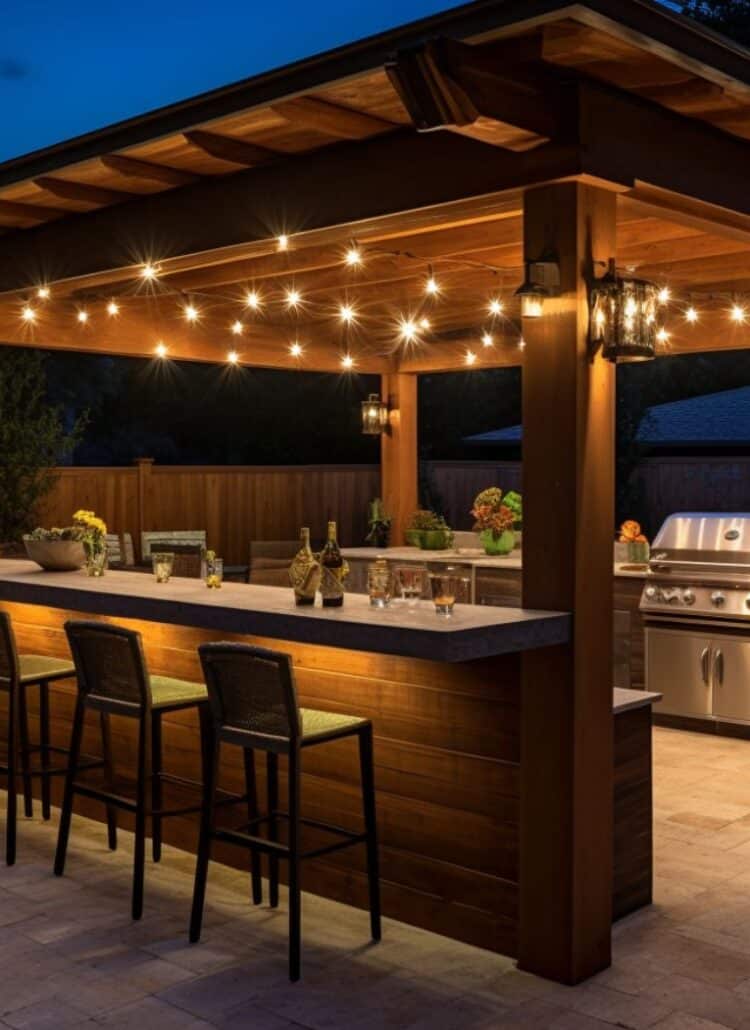
Nature Stone flooring, a recognized choice for both residential and commercial spaces, combines the durability of concrete with the natural beauty of stone.
For a general idea, you might expect to pay anywhere from $6 to $12 per square foot for Nature Stone flooring.
Having said that Let’s chat a bit more about Nature stone. I am going to explain pros and cons of Nature stone.
I am also covering the factors that influence the cost of nature stone flooring.
Let’s get started….
Important: On this website, I feature a select number of partners and companies that have products that could help my audience. As an Amazon associate, When you purchase something through my partner links, I might get paid for the referral at no extra cost to you. Read the full disclosure here.
What is Nature Stone ?
Nature Stone is a good option for floors in places like basements and garages because it’s strong and looks nice.
It’s made from natural stone, which lets air and moisture move through it.
This helps keep away mold and mildew. Nature Stone is also not slippery, so it’s safe to walk on in busy areas.
You can find it in many different looks and colors, so you can choose what you like.
The cost of Nature Stone is usually based on how big the area is that you need to cover, making it an affordable choice for people who want to improve their homes.
Nature Stone is a specific brand that specializes in stone and epoxy flooring solutions.
This flooring combines small stones with epoxy, a strong adhesive used with various materials like wood, metal, and plastic, to create a seamless surface.
It’s particularly effective for covering uneven or cracked concrete, resulting in a smooth and visually appealing floor.
To enhance its appearance, a glossy coating is applied, giving it a lustrous finish.
It’s worth noting that Nature Stone is one brand among several that offer stone and epoxy flooring.
Different companies might install similar flooring, and there are also DIY options available through instructional videos.
Nature Stone distinguishes itself with a unique mix formula and claims to use superior quality materials.
For those considering this type of flooring, it’s advisable to compare the nature stone cost, installation prices, and material quality against other options.
Researching local installers, examining the square footage costs, and considering the specific requirements of your space—be it a garage, basement, or high-traffic area—will help you make a well-informed and cost-efficient decision on whether Nature Stone or another flooring option is the best choice for your project.
How Much Does Nature Stone Cost?
The cost of Nature Stone flooring can vary widely depending on several factors, including the size of the area being covered, the type of stone selected, and the complexity of the installation process.
Typically, Nature Stone is priced per square foot, and the price range can be quite broad.
For a general idea, homeowners might expect to pay anywhere from $8 to $16 per square foot for Nature Stone flooring.
However, this is just a rough estimate.
The cost can increase significantly for premium stone options or if the installation requires additional preparation work, such as repairing the existing surface or adding a moisture barrier.
What factors influence the cost of nature stone?
Prices can vary, and you might save some money if you’re covering a larger area.
The cost can be influenced by several factors beyond just the size of the area.
Where you plan to install the stone, like inside the home, in a garage, on a patio, or in a basement, matters.
The ease of access to the installation site is also key.
For example, if installers have to navigate narrow stairs to bring in their equipment, it could cost more compared to a straightforward, easily accessible area.
Guide to Different Pros and Cons of Tile Flooring
Nature Stone flooring is applied over an existing concrete surface, which must be prepped beforehand.
The extent of preparation needed—such as removing old paint or carpet, fixing cracks, or treating expansion joints—will affect the final cost.
The more repairs and preparation required, especially if the concrete is significantly damaged, the higher the price due to the additional materials needed.
In cases where the concrete is too damaged, it might not be suitable for nature stone flooring at all, leading to extra expenses for concrete replacement from another service.
How do installation costs factor into the overall price of nature stone flooring?
Installation costs can significantly affect the total project cost, encompassing labor costs, the complexity of the installation, and any additional factors such as the condition of the existing concrete and the need for a moisture barrier.
Local installers may charge varying rates, so it’s beneficial to get multiple quotes.
Is nature stone flooring suitable for high-traffic areas?
Nature stone can be a great option for high-traffic areas due to its durability and the ability to withstand wear.
However, the best choice of stone and finish can depend on the specific type of traffic and the level of maintenance you’re willing to commit to.
What are the Pros of Nature Stone ?
Pros of Nature Stone include:
- Resilience to Damage: Nature Stone avoids the chipping and cracking associated with the shrinkage found in concrete floors, highlighting its durability.
- Covers Imperfections: This flooring solution can hide discolored and aged concrete, which might otherwise necessitate costly replacement, offering a fresh and appealing look.
- Resistance to Mold and Mildew: Thanks to its ability to let water evaporate, Nature Stone mitigates the risk of mold and mildew buildup, making it an excellent choice for basement flooring and areas prone to moisture.
- Enhances Aesthetics: Nature Stone floors enhance the visual appeal of any space, making it a popular choice among homeowners for both indoor and outdoor areas.
- Requires Minimal Upkeep: The combination of its natural resistance to common flooring issues and the easy maintenance routine makes Nature Stone a low-maintenance option compared to traditional concrete floors and other types of stone flooring.
- Versatility: Available in various types of stone, colors, and finishes, Nature Stone can be customized to fit the design and functional needs of any project, whether it’s a garage, basement, or outdoor patio.
Guide for Commercial Kitchen Epoxy Flooring Cost
What are the Cons of Nature Stone ?
Cons of Nature Stone include:
- Difficult to Clean: The porous texture of Nature Stone flooring can trap dirt and grime between the stones, making it challenging to clean thoroughly.
- Liquid Penetration: Since liquids can seep through the porous stone and accumulate underneath, this can potentially lead to issues with mold and mildew, contrary to claims of it being a solution.
- Maintenance Requirements: Despite being marketed as low maintenance, the porous nature of the stone might require more effort in cleaning and regular sealing to protect against moisture and staining.
- Additional Costs: The need for special cleaning solutions or professional cleaning services to address the trapped dirt and potential mold issues can lead to higher ongoing maintenance costs.
- Installation Complexity: The installation process of Nature Stone flooring can be more complicated due to its texture and the need for a proper base to prevent moisture buildup, potentially increasing labor costs and the total project cost.
Why is Nature Stone considered to have a high cost?
Nature Stone’s high cost can be attributed to its quality as a natural product, the complexity of the installation process which may require special equipment, and the type of finish chosen, such as polished or honed finishes. These factors contribute to its premium pricing.
How Long Does Nature Stone Last?
Nature Stone flooring is known for its durability and longevity, making it a great option for those looking to invest in new floors for their home or outdoor area.
The lifespan of Nature Stone flooring can significantly vary based on several factors, including the type of stone used, the area of installation, and how well the flooring is maintained.
Proper care plays a crucial role in extending the life of Nature Stone floors.
For instance, in high-traffic areas, regular maintenance and the application of a moisture barrier can help preserve the stone’s condition, preventing wear and damage over time.
The quality of the installation process also affects the flooring’s longevity; hence, choosing experienced local installers who can ensure a correct and secure application is essential.
On average, with the right care and under typical residential conditions, Nature Stone flooring can last for decades. In less demanding environments, such as a basement flooring or a 2-car garage, Nature Stone can maintain its beauty and functionality without significant wear, provided it receives proper care and occasional maintenance.
Are there more affordable alternatives to nature stone that still offer a natural look?
Yes, options such as ceramic tile or vinyl tile can mimic the look of natural stone at a lower cost.
These alternatives offer easier installation and maintenance, though they may not provide the same level of durability or the unique characteristics of real stone.
What additional factors should I consider before choosing nature stone?
Consider the overall style of your space, the amount of traffic, and your budget.
It’s also important to think about the long-term maintenance requirements and how the stone will react to your local climate and the specific conditions in your home.






Leave a Reply